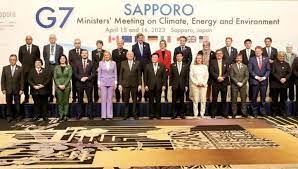
G7 Ministers’ Meeting: Climate, Energy, and Environment Highlights: The recent G7 Ministers’ Meeting on Climate, Energy, and Environment in Sapporo, Japan focused on how advanced economies can make a significant impact on addressing the climate crisis. Because these economies contribute significantly to the problem, prompt action is crucial. The meeting aimed to tackle key issues such as steering the global agenda on climate action and proposing solutions for the same.
April 2023 Current Affairs Quiz
- G7 Commits to Energy Transition and Reducing Fossil Fuels, But More Action Needed for Climate Crisis.
- Following the destabilisation of the worldwide energy market caused by Russia’s invasion of Ukraine, wealthier countries have increased their support for energy transition and diversification.
- To tackle the pressing issue of climate change, the G7 has pledged to raise their offshore wind capacity by 150 GW and their solar capacity by over 1 TW through collective efforts.
- While the commitments made on energy transitions are more than what was initially expected, they may not be enough to keep up with the 1.5 degrees Celsius target, which requires a 10.8 TW renewable energy capacity by the end of the decade.
Importance of Critical Minerals for Sustainable Development
The G7 countries recognize the importance of critical minerals for high-tech industries and national security, but the uneven distribution of these minerals has raised concerns about supply chain vulnerability and potential disruptions. As such, they have committed to diversifying the sources of critical minerals to address these vulnerabilities. However, there are concerns about the social and environmental consequences of mining for these minerals, and it is uncertain how the G7 would boost supply without increasing existing inequities and raising geopolitical concerns about mineral extraction from poorer countries. The communique mentions maintaining high social and governance standards, but more clarity is needed on how these concerns will be addressed.
Climate funding
The G7 acknowledged the need for an ambitious and appropriate new goal on financial flows from both public and private sources, by Article 2.1c of the Paris Agreement. However, the meeting did not result in any financial commitment toward the energy transition for developing nations. Concerning loss and damage, the G7 decided to build on the COP27 decisions to create new finance mechanisms, including the establishment of a fund to assist developing nations. The statement also mentioned accelerating efforts for financing adaptation but did not go beyond reaffirming previous commitments. Despite developing nations’ criticisms of the lack of mobilization of $100 billion annually by wealthy nations, the communique did not offer any additional solutions to address this failure.
Carbon Trading Systems
- Regulatory concerns exist around carbon markets, including poor quality or fake credits.
- Rich countries acknowledge the importance of ensuring high-integrity markets.
- These countries have produced a set of ‘Principles of High-Integrity Carbon Markets’.
- These principles are in addition to other principles being developed in the market, such as the Integrity Council for the Voluntary Carbon Market’s ‘Core Carbon Principles’.
Decarbonization of Industries
- The G7 countries agreed to establish a ‘Climate Club’ conference in 2022 to help companies transition to climate-friendly processes and technologies.However, the meeting did not discuss an action agenda for the club.
- Carbon leakage risk was recognized, but no plan to address it was given.
- A pledge was made to end new plastic pollution by 2040.
The G7 commitment highlights the targets set for solar and wind capacity addition. More weight is being given to solar and wind compared to low-carbon technologies and renewable hydrogen.





